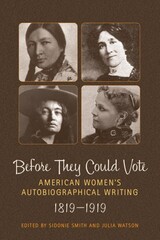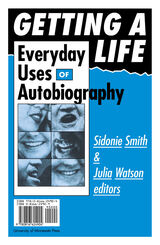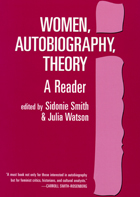
"This rich new anthology sets in motion an inter-textual conversation of remarkable vitality that will change the ways we understand gender, class, ethnicity, culture, and nation in nineteenth-century America."—Susanna Egan, author of Mirror-Talk


A user-friendly guide to reading, writing, and theorizing autobiographical texts and practices for students, scholars, and practitioners of life narrative
The boom in autobiographical narratives continues apace. It now encompasses a global spectrum of texts and practices in such media as graphic memoir, auto-photography, performance and plastic arts, film and video, and online platforms. Reading Autobiography Now offers both a critical engagement with life narrative in historical perspective and a theoretical framework for interpreting texts and practices in this wide-ranging field. Hailed upon its initial publication as “the Whole Earth Catalog of autobiography studies,” this essential book has been updated, reorganized, and expanded in scope to serve as an accessible and contemporary guide for scholars, students, and practitioners.
Sidonie Smith and Julia Watson explore definitions of life narrative, probe issues of subjectivity, and outline salient features of autobiographical acts and practices. In this updated edition, they address emergent topics such as autotheory, autofiction, and autoethnography; expand the discussions of identity, relationality, and agency; and introduce new material on autobiographical archives and the profusion of “I”s in contemporary works. Smith and Watson also provide a helpful toolkit of strategies for reading life narrative and an extensive glossary of mini-essays analyzing key theoretical concepts and dozens of autobiographical genres.
An indispensable exploration of this expansive, transnational, multimedia field, Reading Autobiography Now meticulously unpacks the heterogeneous modes of life narratives through which people tell their stories, from traditional memoirs and trauma narratives to collaborative life narrative and autobiographical comics.

Women, Autobiography, Theory is the first comprehensive guide to the burgeoning field of women’s autobiography, drawing into one volume the most significant theoretical discussions on women’s life writing of the last two decades.
The authoritative introduction by Sidonie Smith and Julia Watson surveys writing about women’s lives from the women’s movement of the late 1960s to the present. It also relates theoretical positions in women’s autobiography studies to postmodern, poststructuralist, postcolonial, and feminist analyses.
The essays from thirty-nine prominent critics and writers include many considered classics in this field. They explore narratives across the centuries and from around the globe, including testimonios, diaries, memoirs, letters, trauma accounts, prison narratives, coming-out stories, coming-of-age stories, and spiritual autobiographies. A list of more than two hundred women’s autobiographies and a comprehensive bibliography of critical scholarship in women’s autobiography provide invaluable information for scholars, teachers, and readers.
READERS
Browse our collection.
PUBLISHERS
See BiblioVault's publisher services.
STUDENT SERVICES
Files for college accessibility offices.
UChicago Accessibility Resources
home | accessibility | search | about | contact us
BiblioVault ® 2001 - 2024
The University of Chicago Press









